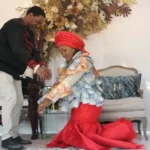Harare – President Emmerson Mnangagwa’s distribution of 318 vehicles to traditional leaders since 2017, at a cost of US$16 million, has ignited a debate about spending priorities in Zimbabwe, The Standard has reported.
This comes as the country grapples with a struggling health sector, rising poverty, and a devastating drought. The vehicle expenditure coincides with separate, lavish car donations by controversial businessman Wicknell Chivayo, raising further questions about political patronage and the blurred lines between business and politics in Zimbabwe.
Mnangagwa has defended the distribution of primarily Isuzu D-Max Double Cab vehicles to the country’s 291 traditional leaders as necessary for their roles. He has also promised broader improvements to their living conditions, including better roads, medical aid, clean water, and solar energy.
However, critics view the largesse, especially amidst economic hardship, as a calculated move to secure the loyalty of a powerful group with significant influence in rural areas – a key voting bloc.
An investigation by Truth Diggers, an investigative arm of Alpha Media Holdings, reveals that the Isuzu D-Max, favoured by the government for traditional leaders, is a rugged, off-road vehicle, ranging in price from US$49,000 to US$52,500.
The distribution began in 2018 with 90 vehicles, followed by another 18 in 2021, and continued this year with 110 vehicles distributed so far. Mnangagwa has pledged to continue this programme.
The timing of these expenditures is particularly striking given Zimbabwe’s current economic woes. Mnangagwa recently appealed for US$3.3 billion in international aid to address the effects of a severe drought, and the government is struggling to fund alternative water sources for Bulawayo, the country’s second-largest city.
While Mnangagwa has been distributing vehicles to traditional leaders, businessman Wicknell Chivayo has been making his own high-profile car donations, primarily to musicians and Zanu PF youths.
This has created unease within the ruling party, with some accusing Chivayo of attempting to “buy his way into the top.” Chivayo’s close association with Mnangagwa and his prominent presence at state events have further fuelled speculation about his motives. This however, changed when the Starlink Zimbabwe deal went sour, leaving Chivayo empty-handed.
Chivayo’s donations include 100 Toyota Aqua vehicles he promised to buy for Zanu PF youths across the 10 provinces, a brand-new Mercedes-Benz S500 for Jah Prayzah, a Mercedes-Benz GLE 300 for Suluman Chimbetu, a Mercedes-Benz GLE400d for Sandra Ndebele, a Toyota Hilux for DJ Masomere, 50 Toyota Aquas for fellow church members, a Toyota Hilux single cab for the Sacred Heart Association of the Roman Catholic Church, and a 2023 Toyota Hilux and Fortuner V8 for his church leader and his wife. In 2023 alone, Chivayo reportedly spent US$1.9 million on personal vehicles, including four Rolls Royces, a Mercedes-Benz Maybach, and a Range Rover.
These parallel acts of automotive largesse, by Mnangagwa to traditional leaders and Chivayo to musicians and party youths, raise concerns about the use of patronage in Zimbabwean politics. Critics argue that these expenditures are designed to secure political loyalty and support rather than address the pressing needs of the population.
Chief Mutekedza defends the government’s provision of vehicles to traditional leaders, claiming it is a fulfilment of a pledge and that chiefs are entitled to new vehicles every five years. National Chiefs’ Council president Mtshane Khumalo was unavailable for comment.
A recent report by Heal Zimbabwe Trust (HZT) highlights concerns about traditional leaders leveraging their positions for political gain and actively participating in Zanu PF campaigns, often through intimidation tactics. The report claims that some chiefs have been rewarded with incentives, including vehicles, farms, and positions, in exchange for their loyalty.
Political analysts have condemned the expenditure on vehicles for chiefs as ill-timed and a reflection of misplaced priorities. They argue that the funds should be directed towards essential services and drought relief efforts.
Some analysts suggest that Mnangagwa is using the vehicles to secure the support of traditional leaders, who play a key role in influencing rural voters, despite constitutional provisions against their involvement in partisan politics.
Others argue that the Mnangagwa administration relies heavily on patronage to maintain power, leading to wasteful spending. The convergence of Mnangagwa’s vehicle distribution and Chivayo’s lavish donations underscores the concerns about patronage and the politicisation of resources in Zimbabwe.












